高中英语语法 倒装句
- 格式:doc
- 大小:32.05 KB
- 文档页数:6
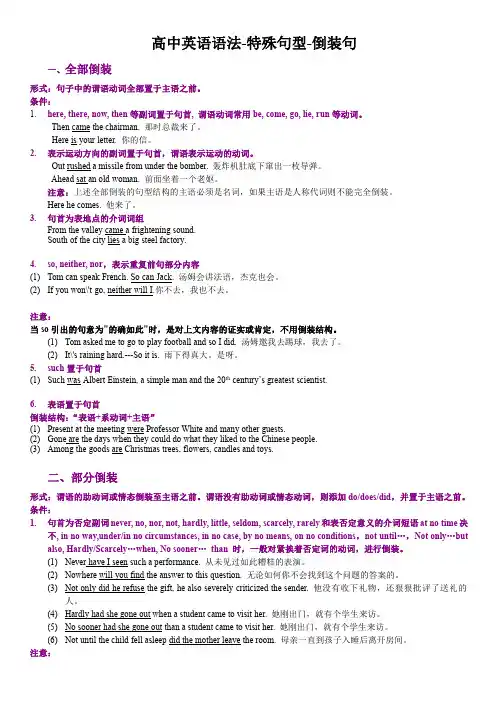
高中英语语法-特殊句型-倒装句一、全部倒装形式:句子中的谓语动词全部置于主语之前。
条件:1.here,there,now,then等副词置于句首,谓语动词常用be,come,go,lie,run等动词。
Then came the chairman.那时总裁来了。
Here is your letter.你的信。
2.表示运动方向的副词置于句首,谓语表示运动的动词。
Out rushed a missile from under the bomber.轰炸机肚底下窜出一枚导弹。
Ahead sat an old woman.前面坐着一个老妪。
注意:上述全部倒装的句型结构的主语必须是名词,如果主语是人称代词则不能完全倒装。
Here he comes.他来了。
3.句首为表地点的介词词组From the valley came a frightening sound.South of the city lies a big steel factory.4.so,neither,nor,表示重复前句部分内容(1)Tom can speak French.So can Jack.汤姆会讲法语,杰克也会。
(2)If you won\'t go,neither will I.你不去,我也不去。
注意:当so引出的句意为"的确如此"时,是对上文内容的证实或肯定,不用倒装结构。
(1)Tom asked me to go to play football and so I did.汤姆邀我去踢球,我去了。
(2)It\'s raining hard.---So it is.雨下得真大。
是呀。
5.such置于句首(1)Such was Albert Einstein,a simple man and the20th century’s greatest scientist.6.表语置于句首倒装结构:“表语+系动词+主语”(1)Present at the meeting were Professor White and many other guests.(2)Gone are the days when they could do what they liked to the Chinese people.(3)Among the goods are Christmas trees,flowers,candles and toys.二、部分倒装形式:谓语的助动词或情态倒装至主语之前。
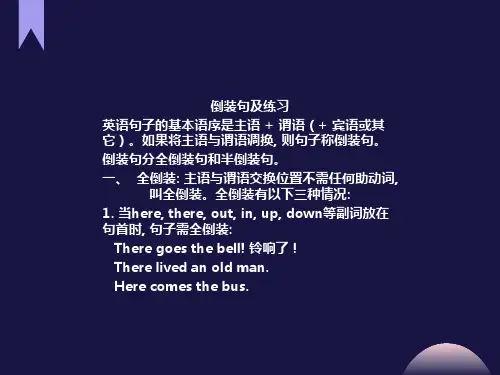
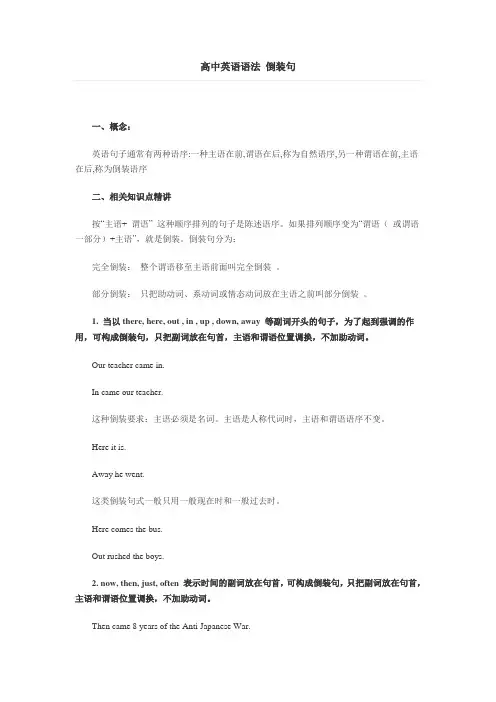
高中英语语法倒装句一、概念:英语句子通常有两种语序:一种主语在前,谓语在后,称为自然语序,另一种谓语在前,主语在后,称为倒装语序二、相关知识点精讲按“主语+ 谓语” 这种顺序排列的句子是陈述语序。
如果排列顺序变为“谓语(或谓语一部分)+主语”,就是倒装。
倒装句分为:完全倒装:整个谓语移至主语前面叫完全倒装。
部分倒装:只把助动词、系动词或情态动词放在主语之前叫部分倒装。
1. 当以there, here, out , in , up , down, away 等副词开头的句子,为了起到强调的作用,可构成倒装句,只把副词放在句首,主语和谓语位置调换,不加助动词。
Our teacher came in.In came our teacher.这种倒装要求:主语必须是名词。
主语是人称代词时,主语和谓语语序不变。
Here it is.Away he went.这类倒装句式一般只用一般现在时和一般过去时。
Here comes the bus.Out rushed the boys.2. now, then, just, often 表示时间的副词放在句首,可构成倒装句,只把副词放在句首,主语和谓语位置调换,不加助动词。
Then came 8 years of the Anti Japanese War.3. 表地点状语的介词短语放在句首,要用倒装句式,以示强调。
这种倒装句也是主谓直接调换位置,不加助动词did, does或do.Under a big tree ________, half asleep.A. did sat a fat manB. a fat man satC. did a fat man satD. sat a fat man4. there放在句首时,要用倒装句式。
在“there + be”结构中的谓语动词有时不用be , 而用表示类似“存在”观念的其他不及物动词。
如:live, stand, come, lie, flow, enter, rise 和appear等。
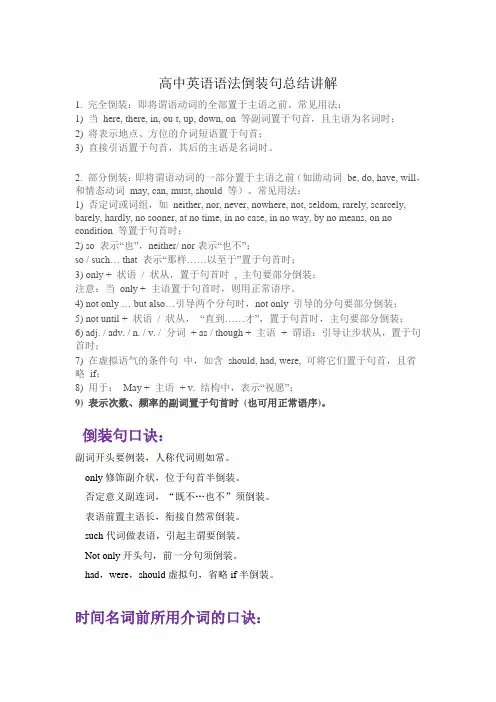
高中英语语法倒装句总结讲解1. 完全倒装:即将谓语动词的全部置于主语之前。
常见用法:1) 当here, there, in, ou t, up, down, on 等副词置于句首,且主语为名词时;2) 将表示地点、方位的介词短语置于句首;3) 直接引语置于句首,其后的主语是名词时。
2. 部分倒装:即将谓语动词的一部分置于主语之前(如助动词be, do, have, will,和情态动词may, can, must, should 等)。
常见用法:1) 否定词或词组,如neither, nor, never, nowhere, not, seldom, rarely, scarcely, barely, hardly, no sooner, at no time, in no case, in no way, by no means, on no condition 等置于句首时;2) so 表示“也”,neither/ nor表示“也不”;so / such… that 表示“那样……以至于”置于句首时;3) only + 状语/ 状从,置于句首时, 主句要部分倒装;注意:当only + 主语置于句首时,则用正常语序。
4) not only … but also…引导两个分句时,not only 引导的分句要部分倒装;5) not until + 状语/ 状从,“直到……才”,置于句首时,主句要部分倒装;6) adj. / adv. / n. / v. / 分词+ as / though + 主语+ 谓语:引导让步状从,置于句首时;7) 在虚拟语气的条件句中,如含should, had, were, 可将它们置于句首,且省略if;8) 用于:May + 主语+ v. 结构中,表示“祝愿”;9) 表示次数、频率的副词置于句首时(也可用正常语序)。
倒装句口诀:副词开头要例装,人称代词则如常。
only修饰副介状,位于句首半倒装。
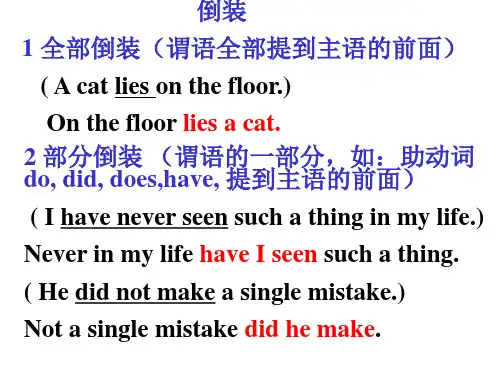
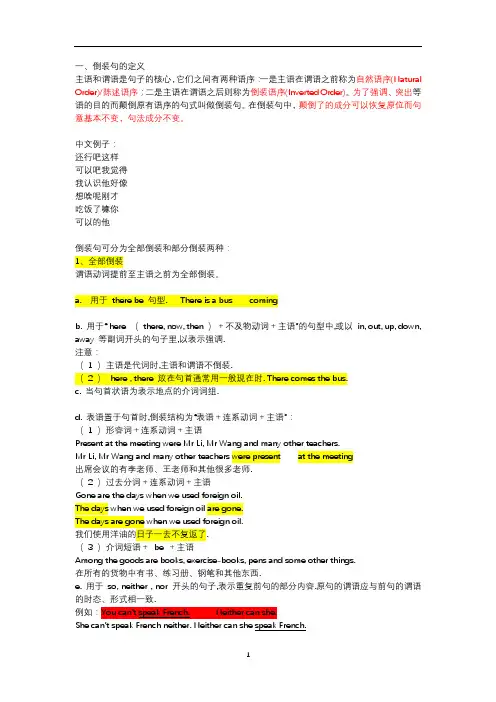
一、倒装句的定义主语和谓语是句子的核心,它们之间有两种语序:一是主语在谓语之前称为自然语序(Natural Order)/陈述语序;二是主语在谓语之后则称为倒装语序(Inverted Order)。
为了强调、突出等语的目的而颠倒原有语序的句式叫做倒装句。
在倒装句中,颠倒了的成分可以恢复原位而句意基本不变,句法成分不变。
中文例子:还行吧这样可以吧我觉得我认识他好像想啥呢刚才吃饭了嘛你可以的他倒装句可分为全部倒装和部分倒装两种:1、全部倒装谓语动词提前至主语之前为全部倒装。
a.用于there be 句型. There is a bus comingb. 用于“ here (there, now, then )+不及物动词+主语”的句型中,或以in, out, up, down, away 等副词开头的句子里,以表示强调.注意:(1 )主语是代词时,主语和谓语不倒装.(2 )here , there 放在句首通常用一般现在时. There comes the bus.c. 当句首状语为表示地点的介词词组.d. 表语置于句首时,倒装结构为“表语+连系动词+主语”:(1 )形容词+连系动词+主语Present at the meeting were Mr Li, Mr Wang and many other teachers.Mr Li, Mr Wang and many other teachers were present at the meeting出席会议的有李老师、王老师和其他很多老师.(2 )过去分词+连系动词+主语Gone are the days when we used foreign oil.The days when we used foreign oil are gone.The days are gone when we used foreign oil.我们使用洋油的日子一去不复返了.(3 )介词短语+be +主语Among the goods are books, exercise-books, pens and some other things.在所有的货物中有书、练习册、钢笔和其他东西.e. 用于so, neither , nor 开头的句子,表示重复前句的部分内容.原句的谓语应与前句的谓语的时态、形式相一致.S he can’t speak French neither. Neither can she speak French.You are a good student. 他也是。
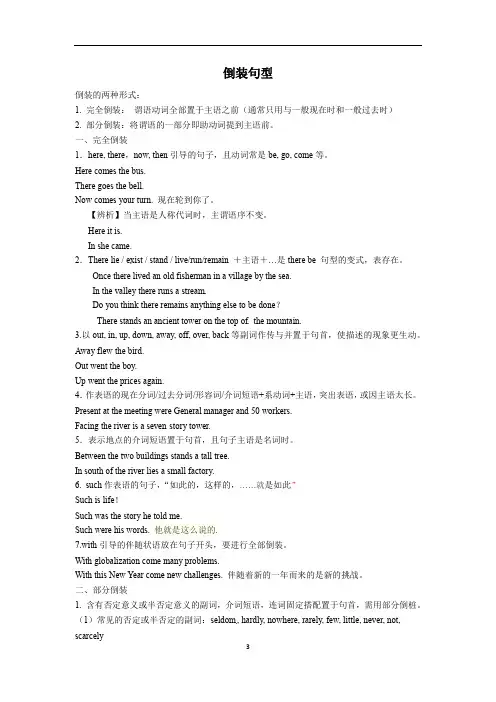
倒装句型倒装的两种形式:1. 完全倒装:谓语动词全部置于主语之前(通常只用与一般现在时和一般过去时)2. 部分倒装:将谓语的一部分即助动词提到主语前。
一、完全倒装1.here, there,now, then引导的句子,且动词常是be, go, come等。
Here comes the bus.There goes the bell.Now comes your turn. 现在轮到你了。
【辨析】当主语是人称代词时,主谓语序不变。
Here it is.In she came.2.There lie / exist / stand / live/run/remain +主语+…是there be 句型的变式,表存在。
Once there lived an old fisherman in a village by the sea.In the valley there runs a stream.Do you think there remains anything else to be done?There stands an ancient tower on the top of the mountain.3.以out, in, up, down, away, off, over, back等副词作传与并置于句首,使描述的现象更生动。
Away flew the bird.Out went the boy.Up went the prices again.4.作表语的现在分词/过去分词/形容词/介词短语+系动词+主语,突出表语,或因主语太长。
Present at the meeting were General manager and 50 workers.Facing the river is a seven-story tower.5.表示地点的介词短语置于句首,且句子主语是名词时。
Between the two buildings stands a tall tree.In south of the river lies a small factory.6.such作表语的句子,“如此的,这样的,……就是如此”Such is life!Such was the story he told me.Such were his words. 他就是这么说的.7.with引导的伴随状语放在句子开头,要进行全部倒装。
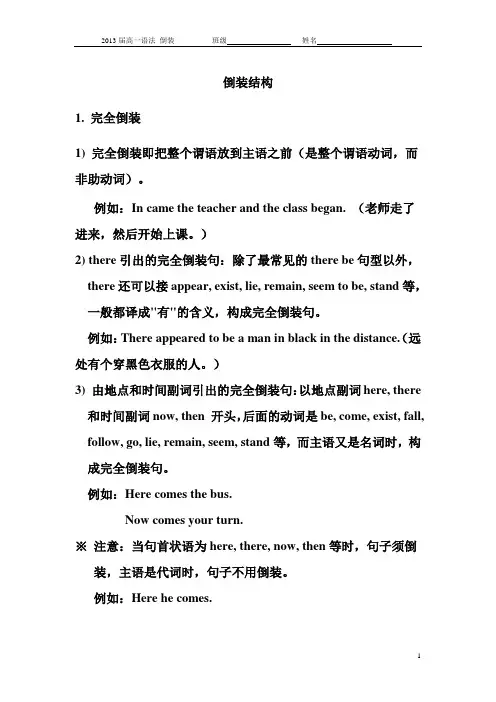
倒装结构1. 完全倒装1) 完全倒装即把整个谓语放到主语之前(是整个谓语动词,而非助动词)。
例如:In came the teacher and the class began. (老师走了进来,然后开始上课。
)2) there引出的完全倒装句:除了最常见的there be句型以外,there还可以接appear, exist, lie, remain, seem to be, stand等,一般都译成"有"的含义,构成完全倒装句。
例如:There appeared to be a man in black in the distance.(远处有个穿黑色衣服的人。
)3) 由地点和时间副词引出的完全倒装句:以地点副词here, there 和时间副词now, then 开头,后面的动词是be, come, exist, fall, follow, go, lie, remain, seem, stand等,而主语又是名词时,构成完全倒装句。
例如:Here comes the bus.Now comes your turn.※注意:当句首状语为here, there, now, then等时,句子须倒装,主语是代词时,句子不用倒装。
例如:Here he comes.4)表示运动方向的副词或地点状语置于句首,谓语表示运动的动词且主语是名词时使用完全倒装例如:Up went the plane.. the plane went up.In came the chairman.注意:如果主语是代词则不发生倒装。
例如:Out they rushed!Lower and lower he bent.5) 在直接引语之后在叙事性书面语中,直接引语后常跟asked Mary, answered John, said the old lady, grunted Peter之类的词语。
在这些词语中,动词常的主语之前。
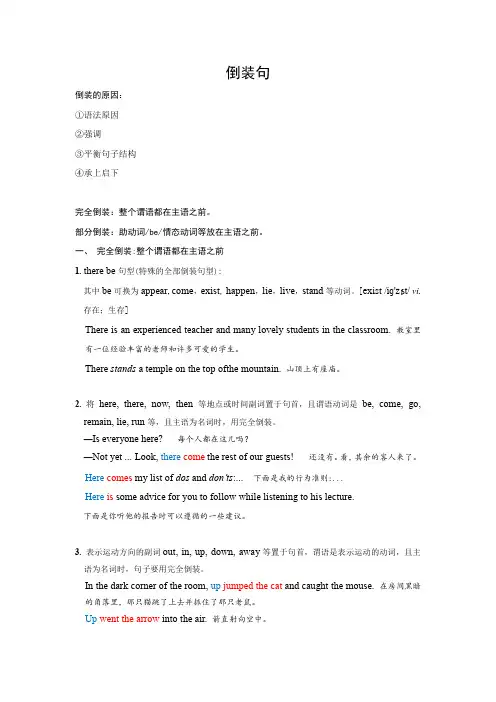
倒装句倒装的原因:①语法原因②强调③平衡句子结构④承上启下完全倒装:整个谓语都在主语之前。
部分倒装:助动词/be/情态动词等放在主语之前。
一、完全倒装:整个谓语都在主语之前1. there be句型(特殊的全部倒装句型):其中be可换为appear, come,exist, happen,lie,live,stand等动词。
[exist/iɡ'zɪst/ vi.存在;生存]There is an experienced teacher and many lovely students in the classroom. 教室里有一位经验丰富的老师和许多可爱的学生。
There stands a temple on the top ofthe mountain. 山顶上有座庙。
2. 将here, there, now, then等地点或时间副词置于句首,且谓语动词是be, come, go, remain, lie, run等,且主语为名词时,用完全倒装。
—Is everyone here? 每个人都在这儿吗?—Not yet ... Look, there come the rest of our guests! 还没有。
看,其余的客人来了。
Here comes my list of dos and don’ts:... 下面是我的行为准则:...Here is some advice for you to follow while listening to his lecture.下面是你听他的报告时可以遵循的一些建议。
3. 表示运动方向的副词out, in, up, down, away等置于句首,谓语是表示运动的动词,且主语为名词时,句子要用完全倒装。
In the dark corner of the room, up jumped the cat and caught the mouse. 在房间黑暗的角落里,那只猫跳了上去并抓住了那只老鼠。

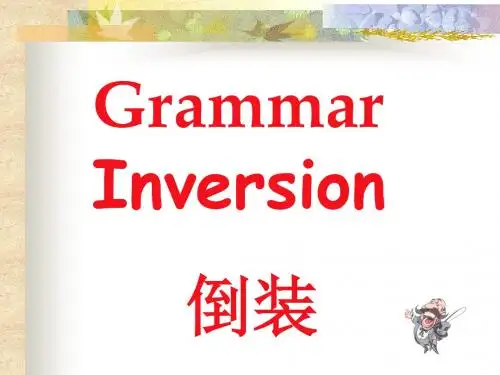
高中英语语法——倒装句一、完全倒装(full inversion)——谓语部分完全放在主语之前1. there be 句型属于完全倒装Be可以换成“stand、live、exist、lie、remain、seem、appear”2. 副词,介词放在句首,且主语是名词Here、now、then、out、in、up、down、away、behind、under、+come、follow、fall、exist、lie、go、remain、run、+主语3. 表语前置倒装形容词、分词、介词短语、such、+be+主语二、部分倒装(partial inversion)——be、助动词、情态动词放在主语之前1. only修饰副词、介词、或状语从句放句首,主句部分倒装2. 否定词、表示否定意义的短语放句首,部分倒装。
Never、nor、not、hardly、little、seldom、scarcely、rarely;at no time、in no case、by no means、on no condition、under/in no circumstance3. 固定句型①so+be、情态动词、助动词+主语=It is/was the same with;so it is/was with…也是如此②neither/nor+be、情态动词、助动词+主语=…也不这样③So+adj./adv.+助动词+主语+动词+that 如此…以至于…Such+(a/an+)adj.+n.+助+主+动词that…④Neither 助+主+动词…,nor +助+主+动词…⑤Not only +倒装,but also 正常.⑥Not until…+主句部分倒装三、形式倒装(formal inversion)——强调部分提前,主谓并不倒装1. 感叹句What a/an +形容词+名词+主语+谓语!How 形容词+a/an+名词+主语+谓语!How 形容词/副词+主语+谓语!2. the more…,the more….The harder you work,the greater progress you have.3. however/whatever 引导的让步状语从句However difficult the problem may be,we must work it out this evening。
高中英语语法倒装句谓语或谓语的一部分放在主语之前的语法现象,就称之为倒装。
从倒装的形式来看,可分为完全倒装和部分倒装两大类。
前者是指整个谓语置于主语之前,而而后者仅指助动词、情态动词或be动词等置于主语之前。
一. 完全倒装完全倒装又可称为全部倒装。
完全倒装是只将句子中的谓语动词全部置于主语之前。
此结构通常只用于一般现在时和一般过去时。
常见的结构有:(1)here,there,now,then,thus等副词置于句首,谓语动词常用be,come,go,lie,run等表示来去或状态的动词。
例如:Then came the teacher. 那时老师来了。
Here is your letter. 你的信。
(2)表示运动方向的副词或地点状语置于句首,谓语表示运动的动词。
例如:Ahead sat an old woman. 前面坐着一个老大妈。
注意:上述全部倒装句型结构的主语必须是名词,如果主语是人称代词则不能完全倒装。
例如:Here he comes. 他来了。
Away they went. 他们走开了。
二. 部分倒装部分倒装是指将谓语的一部分如助动词或情态倒装放到主语之前。
如果句子的谓语没有助动词或情态动词,则需添加助动词do,does 或did,并将其置于主语之前。
(1)句首为否定或半否定的词语,如no, not, never, seldom, little, hardly, at no time, in no way, not until…等。
例如:Never have I seen such a performance.从未见过如此糟糕的表演。
Nowhere will you find the answer to this question.无论如何你不会找到这个问题的答案的。
Not until the child fell asleep did the mother leave the room.母亲一直到孩子入睡后才离开房间。
倒装句一、全部倒装全部倒装即把整个谓语部分放在主语之前。
当副词here, there, in, out, up, down, away, back, then, ahead, off, over等位于句首、谓语动词常为be, come, go, follow, run, rush, fly, fall等不及物动词,而且主语又是名词时,用完全倒装。
注意:此类倒装只限于一般现在时和一般过去式,不用进行时态并且若主语是代词时,不用倒装。
同学们可借助下面的图形速记用于完全倒装的词。
1.介词短语(地点状语)+不及物动词+主语Under the tree sits a beautiful girl.=A beautiful girl sits under the tree. 树下坐着一位漂亮的女孩。
South of the lake lies a big supermarket. 湖泊的南边是一个大超市。
20 miles east of our school lies a modern swimming pool. 我们学校向东20英里有一个现代化的游泳池。
On the floor were piles of old books, magazines and newspapers. 地板上是一堆堆旧的书报杂志。
2.表方向、地点的副词(here, there, up, down, away)+不及物动词+主语,构成的全部倒装句Hearing the dog barking fiercely, away fled the thief. 听到狗的狂叫声,小偷逃掉了。
Here comes the bus. 公交来了。
There goes the bell. 铃响了。
3.“主+系+表”结构如强调表语通常转化为“表+系+主”(表语通常为形容词、现在分词和过去分词)的全部倒装句。
Happy are those who are contented. =Those who are contented are happy. 知足常乐。
倒装句英语句子的主语通常位于谓语动词之前,这种语序被称为正常语序。
但有时出于强调或某种特殊的语法结构的需要,需要将谓语动词放在主语之前,这种语序则叫倒装语序。
按倒装的形式,倒装可分为两类,一是完全倒装,二是部分倒装。
完全倒装是指全部谓语放在主语之前,部分倒装是指只把助动词、情态动词或be动词放在主语之前,谓语的主体部分仍在主语之后。
一、完全倒装1. 用于 there be 句型。
例:There are many students in the classroom.原句自然顺序是:Many students are there in the classroom.★2. 表示地点的here和there位于句首时,其后用完全倒装形式。
这类倒装句的谓语通常是动词be和come, go等表示移动或动态的不及物动词,以及stand, lie, live等表示状态的动词(表示存在)。
例:Here comes the bus. 公共汽车来了。
There goes the last train. 最后一班火车开走了。
There stood a desk against the wall. 靠墙放着一张书桌。
注意:若主语为人称代词,则不倒装。
如:Here you are. 这就是你要的东西。
(给你。
)Here it comes. 它来了。
★3. 表示方向的副词away, down, in, off, out, over, round, up等位于句首时,其后用完全倒装语序。
这类倒装句的谓语通常表示动态的不及物动词。
Out rushed the puppy. 小狗冲了出去。
Away went the girl. 那个女孩走远了。
Down came the rain and up went the umbrellas.下雨了,伞都撑起来了。
注:若主语为人称代词,则不能用倒装。
如:In he comes. 他走了进来。
Down it came.它掉了下来。
★4. 表示时间或顺序的副词now, then 等位于句首时,其后用完全倒装语序。
这类倒装句的谓语通常表示动态的不及物动词。
如:Now comes your turn. 现在轮到你了。
Then came a new difficulty. 这时又产生了一个新的困难。
★5. 当句首状语是表示地点的介词词组时,也常引起全部倒装。
South of the city lies the factory. 工厂位于城市南部。
From the valley came a frightening sound. 一个令人害怕的声音从村子里传了出来。
Under the tree stands a little boy. 一个小男孩站在树下。
★6. 表语置于句首时,倒装结构采用“表语+连系动词+主语”的结构1)形容词+连系动词+主语Present at the meeting were Professor White, Professor Smith and many other guests. 出席本次会议的有怀特教授、史密斯教授和其他各位嘉宾。
2) 分词+连系动词+主语Gone are the days when they could do what they liked. 他们想做什么就做什么的日子过去了。
Attending the meeting was Mr. Black. 布莱克先生出席了本次会议。
3) 介词+连系动词+主语Among the goods are Christmas trees, flowers, candles and toys. 商品中有圣诞树、花、蜡烛和玩具。
Among them was my friend Jim. 他们当中就有我的朋友吉姆。
注:在表语置于句首的倒装结构中,要注意其中的谓语应与其后的主语保持一致,而不是与位于句首的表语保持一致。
In the box was a cat. 箱子里是一只猫。
In the box were two cats. 箱子里是两只猫。
7. 使用完全倒装以保持句子结构平衡,或为了强调表语或状语,或为了使上下文结构紧凑。
They arrived at a farmhouse, in front of which sat a small boy. 强调状语Inside the pyramids are the burial rooms for the kings and queens and long passages to these rooms. 保持句子结构平衡8. 在直接引语全部或部分置于句首时,引用动词和它的主语(名词)往往要倒装。
主语是代词时一般不倒装。
“You’ve made great progress this term.”said the teacher.“Tom”,said his father, “ You shouldn’t make friends with such boys!”“Let’s go,” said the man / he said.二、部分倒装1. 用于疑问句。
例:Do you speak English?★2. 当虚拟条件句的谓语动词含有 were, should, had 时,可省略 if ,并将 were, should, had置于句首。
例:Had you reviewed your lessons, you might have passed the examination.Had it rained yesterday, the crops would have been saved.Were it to rain tomorrow, the crops would be saved.Should it rain tomorrow, the crops would be saved.注:若条件从句为否定句,否定词not应置于主语之后,而不能与were, should, had 等缩略成Weren’t, Shouldn’t, Hadn’t而置于句首。
如:Were it not for your help, I wouldn't be doing so well.若不是你帮忙,我现在不会干得这样好。
★3. 用于“形容词(或名词、动词、副词)+ as (though)”引导的让步状语从句。
例:Pretty as she is, she is not clever. 尽管她很漂亮,但她不聪明。
Try as he would, he might fail again. 无论他尝试了多少次,总会失败。
Child as he is, he knows a lot. 尽管他是一个孩子,他却知道很多知识。
(要特别注意位于句首的名词前习惯上不用冠词,即使其前有形容词修饰也不用冠词)Much as I have travelled, I have never seen such a beautiful place. 我旅游那么多次,却从未见过如此美丽的地方。
Successful as he is, he is not proud.他虽然成功,但不骄傲。
Much as I like you, I couldn’t live with you.我尽管很喜欢你,却不能和你在一起生活。
Fast as you read, you can’t finish the book in two days.尽管你读得很快,你总不能在两天之内就读完这本书。
★4. 用于No sooner …than…/ Hardly…when…/ Scarcely…when…和 Not until 的句型中。
No sooner had she gone out than the class began. 她刚走出去课就开始了。
No sooner had I got into the house than the phone rang.我刚进屋,电话铃就响了。
Hardly had they reached Edinburgh when they were ordered to return to London. 他们刚到达爱丁堡就被命令返回伦敦。
Not until the teacher came did he finish his homework. 直到老师回来他才完成了作业。
Not until the child fell asleep did the mother leave the room. 直到孩子睡着了母亲才离开房间。
★★5. 当 never, hardly, seldom, scarcely, little, at no time, in no case, by no means, on no condition, on no accounts, under no circumstances, not only, barely, rarely, little, not a bit等含有否定意义的副词若位于句首,则其后要用部分倒装。
例:Never shall I do this again. 我再也不会这么做了。
At no time can you say “no” to the order. 你绝不可以对任何命令说“不”。
Seldom does he read in his free hours.他空余时间很少看书。
By no means should he be left alone.绝不能把他单独留下。
Hardly could the old man stand on his feet in the strong wind.老人在这阵狂风中几乎站不住了。
Never will you achieve anything if you spend your time that way.你若总是这样消磨时间,就永远不会有所成就。
Not only did he speak more correctly, but he spoke more easily.不仅他讲得更正确,也讲得更不费劲了。
In no case should you give up.你绝不能放弃。
On no accounts can my name be mentioned to anyone.我的名字是绝不能向任何人提起的。
Little did they know they were to be reunited ten years later.他们简直想不到10年后竟又能团聚。
Nowhere is drug abuse more of a problem than in the US. 没有什么地方吸毒问题比美国更严重。